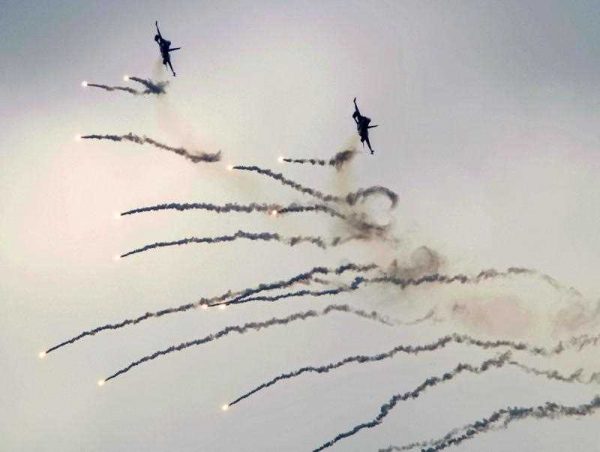The Ten Thousand Swords missile, or the ‘Wan Chien’ missile, is an aircraft-launched standoff missile that creates a barrage to destroy enemy facilities such as air bases, runways and missile launching sites. Its accuracy is enhanced by radars and GPS, with a striking range of 300 kilometres. Taiwan’s Ministry of National Defense has installed the missile in 40 Indigenous Defence Fighter (IDF) aircrafts to date and intends to complete installation on all 127 IDF aircraft by the end of 2016.
Recent People’s Liberation Army (PLA) modernisation efforts are formidable. Taiwanese forces seem frail and vulnerable against the stronger China. In 2014, China will spend approximately US$132 billion on its defence budget; a 12.2 per cent increase from the previous year. In contrast, Taiwan merely spends around US$10 billion on its defence and is not always able to procure the arms it favours from the United States.
Taiwan insists that the new system makes an important contribution to its security. The Ten Thousand Swords missile capability is considered strategically important because it enables Taiwanese aircrafts to hit targets in mainland China from the Taiwan Strait. Taiwanese aircrafts will no longer have to risk flying deep into Chinese airspace to hit key facilities and infrastructure.
But this does not reflect the realities of China’s thinking. The PRC aims to change Taiwan’s perception of its own security so that the island will forego any aspirations to declare independence. This includes the deployment of at least 1,600 short-range missiles as an intimidation tactic. The Ten Thousand Swords missile system is likely to compel China to further accelerate its military modernisation efforts. In a contingency scenario Beijing may aim to coerce Taipei into capitulation either before US military support arrives or by preventing US troops from accessing the vicinity of Taiwan. Taiwan’s decision to deploy the Ten Thousand Swords aggravates the security dilemma and undermines the security Taipei is trying to bolster.
The security dilemma — the situation where actions by one state intended to heighten its security lead other states to respond with similar measures, producing a spiral of increased tensions — has been a longstanding feature of Cross-Strait relations. Taiwan’s previous military procurement and acquisition choices often created tensions with the PRC and destabilised regional security. In response to the increased number of PLA fighter jets and missiles deployed close to its territory, Taipei has vigorously strived to strengthen its security. In May 2000, the Chung Shan Institute of Science and Technology, a military-owned research organisation in Taiwan, launched a missile project aimed at disabling Chinese military units. With similar intent, the Ten Thousand Swords missile was developed to surpass the AGM-154 air-to-surface glide missile which the United States refused to offer Taipei. As such, Taipei believes that by acquiring the capability to shell key PLA facilities, it can bolster deterrence by denial.
Taiwan’s belief is ill-founded. The deployment of the Ten Thousand Swords missiles increases the chances of Taiwan being struck first. The missiles are capable of reaching farther into PRC territory than other missiles Taiwan currently possesses. But the extended radius, coupled with the offensive capability, will give China added incentive to strike first in the case of war. To ensure the mobility of PLA aircraft, China’s Second Artillery would be likely to initiate a strike to neutralise Taiwan’s air bases. China also has the capability to deploy additional missiles from other regions to the coast of Fujian and inflict a severe bombardment on Taiwan. As a result, China’s artillery forces have the capability to pre-empt any Taiwanese IDF missile strikes.
At the politico-strategic level, the missile empowers Taiwan’s de facto independence. Predictably, Beijing will perceive the acquisition of these missiles as a threat to its unification efforts. Although President Ma Ying-jeou alleviated tensions by reiterating the ‘three no’s’ — no independence, no unification, and no use of force — the procurement of these missiles, which can theoretically be used for offensives purposes, is likely to stoke Beijing’s scepticism towards Ma’s commitment to ease Cross-Strait tensions. As such Beijing may increase its efforts to prevent Taiwan acquiring further arms in the future.
To avoid cataclysm, Taiwan should focus its efforts of defensive weapons systems. Beijing will interpret Taipei’s procurement of offensive capabilities as a move towards secession from the mainland and this will increase the likelihood of war. An exclusively defensive approach to security will help to alleviate tensions, create an exit from the vicious circle of the security dilemma, and decrease the possibility of war in the Taiwan Strait.
Che-Yu Ou is a graduate student at Waseda University, Japan. He previously attained a BA in Economics from University of Victoria, Canada.


“Taiwan’s decision to deploy the Ten Thousand Swords aggravates the security dilemma and undermines the security Taipei is trying to bolster.”
The PRC still reserves the right to use force against the people on the island of Taiwan; this aggravates the security of the whole Asia-pacific region does it not?
“But the extended radius, coupled with the offensive capability, will give China added incentive to strike first in the case of war.”-This is irrelevant. China will start first IF there is war with Taiwan. Period. Why would Taiwan ever start first? Nobody’s going to help, and it has no need to until China decrees war.
“It will heighten offensive capabilities”-if that somehow prompts China to heighten offensive or defensive capabiilties in a greater measure, we can do something about it. But as you mention China already has the 1600 missiles pointing to Taiwan, S300 system right across Taiwan. This isn’t Indo Pak nuclear race. China can’t get stronger, and if it does, it will place it’s best weapons in the vicinity regardless of what Taiwan aims at China.